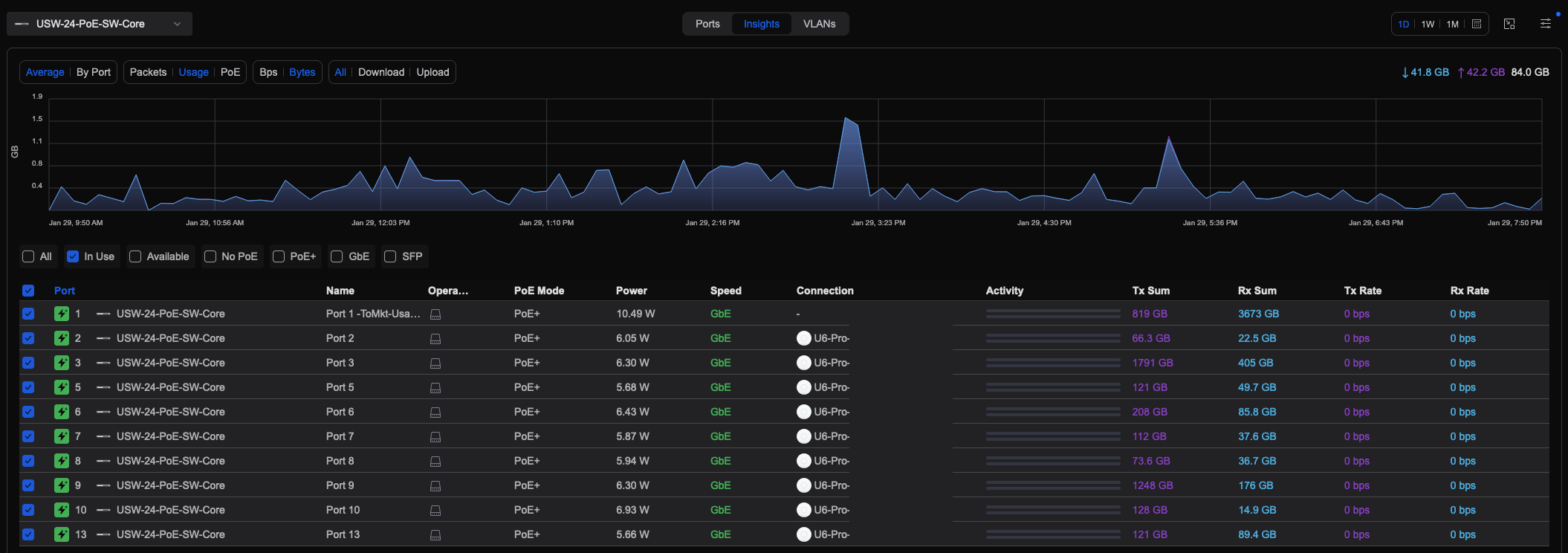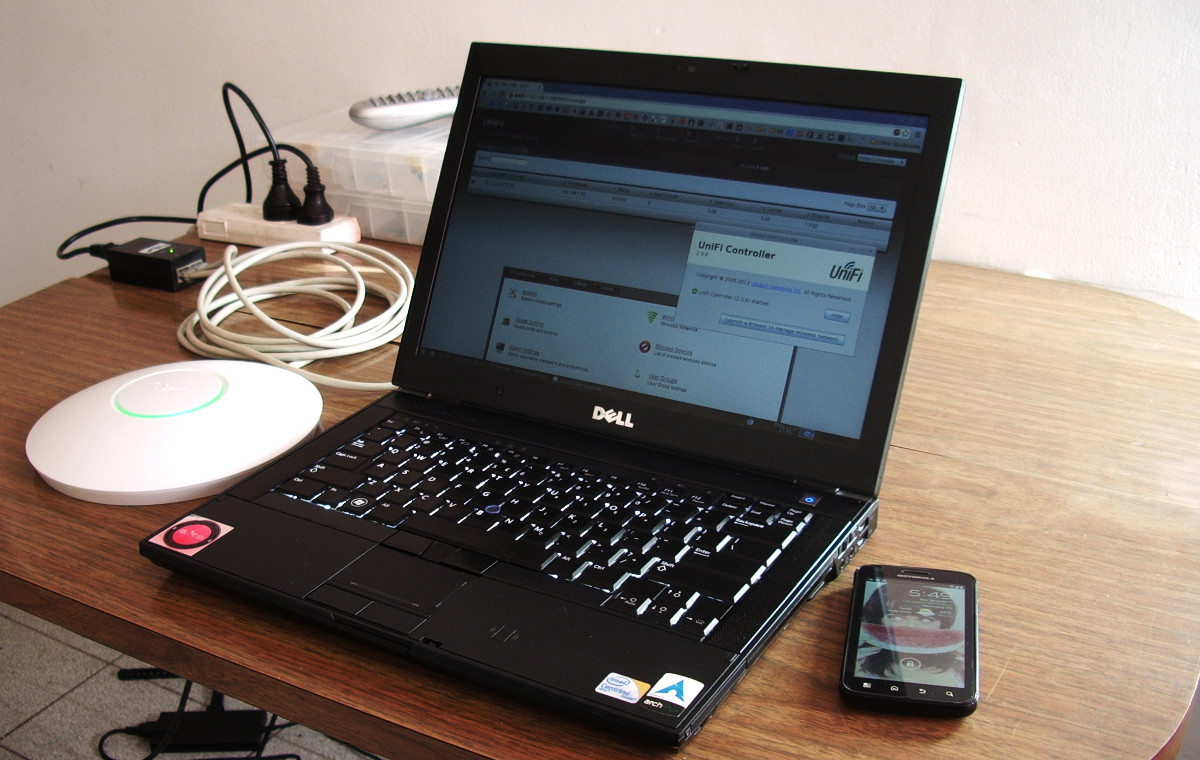Raspberry Pi UniFi Controller Mastery
30 Jan 2024The UniFi Controller software offers seamless network management for users with multiple UniFi products. While setting it up on a Raspberry Pi seems like a pragmatic choice, several considerations can significantly impact your experience. The UniFi Controller software is great for managing a network if you have multiple UniFi products, such as a router/switch and a hand of UniFi UAPs.
You could either:
- Run the UniFi controller on your computer.
- Run the UniFi controller on a server.
- Run the UniFi controller in the “cloud”.
Running the Controller in the “cloud” is a no-go for me, it’s not a privacy-minded decision and most of us wouldn’t rest assured of the security of a cloud environment where we can barely control things.

UniFi controller UI is slick
Running the Controller on my laptop sacrifices the versatility that multiple admins can manage the network, and if I go on vacation no one (nor me) could control the network.
So running a local server sounds like the best trade-off for us, since we haven’t bought a server yet, I decided to run the controller on a Raspberry PI 3, sighs in bad decisions.
- An old MongoDB version
- MongoDB version limitations
- MongoDB is fragile
- Don’t try to start the mongod.service
- Disk writes are heavy
- Memory pressure is heavy
- Conclusion
An old MongoDB version
The UniFi controller software uses MongoDB as the main database, sigh. It’s not only unreliable, but it also requires you to run MongoDB 4.4, from 2020. While it may not sound that old, it is old. And the latest Linux distributions don’t include that version in their repos.
curl https://pgp.mongodb.com/server-4.4.asc | sudo gpg --dearmor | sudo tee /usr/share/keyrings/mongodb-org-server-4.4-archive-keyring.gpg >/dev/null
echo 'deb [arch=amd64,arm64 signed-by=/usr/share/keyrings/mongodb-org-server-4.4-archive-keyring.gpg] https://repo.mongodb.org/apt/ubuntu focal/mongodb-org/4.4 multiverse' | sudo tee /etc/apt/sources.list.d/mongodb-org-4.4.list > /dev/null
sudo apt update
sudo apt install -y mongodb-org-server
MongoDB version limitations
There’s an additional limitation: MongoDB 4.4 > 4.4.23 wouldn’t work on a Raspberry PI. It just crashes with an illegal instruction, and probably with a core dump.
apt install \
mongodb-org=4.4.18 \
mongodb-org-server=4.4.18 \
mongodb-org-shell=4.4.18 \
mongodb-org-mongos=4.4.18 \
mongodb-org-tools=4.4.18
MongoDB is fragile
This isn’t news, but since the UniFi controller uses MongoDB as the main database, you need to take care of backups. A power outage may leave the SD Card partition broken, or at least with some errors, that can make the MongoDB data folder unrecoverable, and I bet the UniFi recovery guide wouldn’t help you.
file:WiredTiger.wt, connection: WiredTiger.wt read error: failed to read 4096 bytes at offset 73728: WT_ERROR: non-specific WiredTiger error
Don’t try to start the mongod.service
The UniFi Controller has a built-in mechanism to start and stop MongoDB. If you start mongod.service manually, the UniFi service wouldn’t start. This also applies if you enabled the unit through Systemd.
Disk writes are heavy
The UniFi Controller writes each UniFi device status in a JSON file inside /var/log/unifi/remote, in a matter of minutes, and with 10 UniFi devices you could get around 100MB worth of data written to the SD.
root@controller:/var/log/unifi/remote# ls
10.115.254.227_ac8baREDACTED.log 10.115.254.231_ac8baREDACTED.log 10.115.254.237_ac8baREDACTED.log
10.115.254.228_ac8baREDACTED.log 10.115.254.232_ac8baREDACTED.log 10.115.254.254_ac8baREDACTED.log
10.115.254.229_e4388REDACTED.log 10.115.254.234_ac8baREDACTED.log 10.115.254.238_ac8baREDACTED.log
10.115.254.230_ac8baREDACTED.log 10.115.254.235_ac8baREDACTED.log 10.115.254.239_ac8baREDACTED.log
root@controller:/var/log/unifi/remote# du -sh .
240M .
Naturally, each time I configure a new Raspberry PI I install log2ram on it. log2ram creates a RAM mount point for /var/log so your SD Card doesn’t suffer from heavy writing. The problem arises from how much memory you borrow from the RAM itself into the mount point. For devices with low RAM like these (1GB), I wouldn’t pick more than 100MB for the /var/log/ partition.
logrotate to the rescue
I use logrotate to limit the amount of data stored by the UniFi Controller with the following configuration stored in /etc/logrotate.d/unifi-remote
/var/log/unifi/remote/*.log {
rotate 0
size 5M
compress
missingok
notifempty
copytruncate
create 0644 unifi unifi
}
This way each file wouldn’t weigh more than 5MB and with rotate 0 I prevent logrotate from generating .gz and .0 files from rotated logs.
Memory pressure is heavy
The UniFi controller software is a Java application and indeed uses too much memory. The Raspberry PI would hang after a few minutes of operating the UniFi console. To avoid that I tend to lower the XmX Java parameter on the /lib/systemd/system/unifi.service file. 512M would suffice.
- "UNIFI_JVM_OPTS=-Xmx1024M -XX:+UseParallelGC"
+ "UNIFI_JVM_OPTS=-Xmx512M -XX:+UseParallelGC"
Conclusion
Deploying the UniFi Controller on a Raspberry Pi offers cost-effective network management, but it comes with its share of challenges. The outdated MongoDB version, fragility of the database, and disk write issues demand careful consideration. Armed with these insights, you can navigate the UniFi on Raspberry Pi journey more effectively, ensuring a robust and reliable network management solution tailored to your needs.
Last but not least, a picture I took in 2012 configuring one of the first Ubiquiti products I bought for a company Internet setup. An original 1st gen UniFi UAP, with its classic green light, next to my beloved Dell Latitude E6400 and Motorola Atrix.


